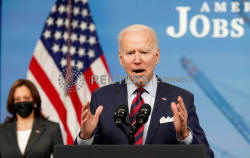What to watch for in Biden's first full budget: Medicaid, the
environment, Pentagon spending
 Send a link to a friend
Send a link to a friend
 [May 27, 2021] By
Andrea Shalal and Trevor Hunnicutt [May 27, 2021] By
Andrea Shalal and Trevor Hunnicutt
WASHINGTON (Reuters) - President Joe Biden
will unveil his first full budget on Friday, setting the stage for a
pitched battle with Republicans opposed to his plans to spend trillions
on infrastructure, childcare and other public works.
The Democratic president in April provided a partial https://www.reuters.com/world/us/first-white-house-budget-proposal-preview-bidens-goals-2021-04-09wish
list for about $1.5 trillion in government spending for the fiscal year
that starts on Oct. 1, just a sliver of the total budget.
Friday will see more details, from foreign aid to immigration and
policing, and could include jumps in funding for Medicaid and other
social programs that consume most federal government spending.

NO SURPRISE INITIATIVES
Do not expect any previously undisclosed major policy initiatives, said
Rob Friedlander, spokesman for the Office of Management and Budget.
Instead, look for details on Biden's $4 trillion plans to bring more
women back into the workforce, fund home care for the aging and
disabled, expand broadband coverage to underserved and rural areas and
combat climate change, by raising taxes on companies and the wealthy.
"The president's budget will ... include the American Jobs Plan, the
American Families Plan, and the president's proposals to reinvest in
research, education, clean energy, public health, and other critical
priorities," Friedlander said.
Congress, where Democrats have a narrow majority, must pass any budget.
Biden hopes to secure Republican support for some of that investment -
but may rely on a congressional procedure known as reconciliation to
pass it without Republican backing.
Biden will need to corral the often-warring progressive and moderate
wings of his own Democratic Party to do so.
PROGRESSIVE PROMISES?
Biden made sweeping campaign promises to progressive voters about what
he would get done during his presidency, from cutting student loan debt
to adding a public option to the Obamacare health insurance law.

They may be disappointed.
"Every entity may not be reflected in this budget," White House press
secretary Jen Psaki said last week, when asked about pledges on drug
pricing and health insurance.
[to top of second column] |

U.S. President Joe Biden speaks about jobs and the economy at the
White House in Washington, U.S., April 7, 2021. REUTERS/Kevin
Lamarque/File Photo

PENTAGON PRIORITIES
Biden's initial proposal to keep Pentagon spending roughly flat in
inflation-adjusted terms angered liberals who want to cut the funding and hawks
who want it raised.
Friday's budget may show how sharply Biden plans to shift focus away from the
Middle East, as well as the cost impact of withdrawing troops from Afghanistan
and the level of funding for emerging threats like China.
It will also show how much Biden wants the Pentagon to invest in fighting cyber
crime, climate change and environmental mediation.
AFTER GAZA
Some progressive lawmakers, such as Senator Bernie Sanders, want Biden to cut
military aid to Israel following its air strikes in Gaza that killed dozens of
civilians in response to rocket fire from Hamas militants.
But White House aides said they were happy with the program and expect to keep
funding consistent.
Egypt, which was a key intermediary for U.S. diplomacy during 11 days of
fighting, is also expected to remain a major recipient of U.S. aid despite
concerns over Egyptian President Abdel Fattah al-Sisi's crackdown on political
dissent.
DEBT, ECONOMIC GROWTH
The budget is likely to include detailed economic growth assumptions and deficit
projections that will be heavily scrutinized by economists, political opponents
and investors.

Biden argues his investment plans would expand the economy by creating jobs,
funding research and freeing up more workers.
The president's proposal to pay for home care for the elderly and disabled would
boost funding for the healthcare program Medicaid, a target of deficit hawks, by
$400 billion over a decade.
CLIMATE CHANGEBiden's budget will put meat on the bones of the U.S. pledge to
cut greenhouse gas emissions by more than 50% below 2005 levels over the next
decade as its new Paris agreement target, after his "skinny budget" proposed $14
billion to fight climate change in fiscal 2022.
(Reporting by Andrea Shalal, Trevor Hunnicutt and Valerie Volcovici; Editing by
Heather Timmons and Peter Cooney)
[© 2021 Thomson Reuters. All rights
reserved.] Copyright 2021 Reuters. All rights reserved. This material may not be published,
broadcast, rewritten or redistributed.
Thompson Reuters is solely responsible for this content. |